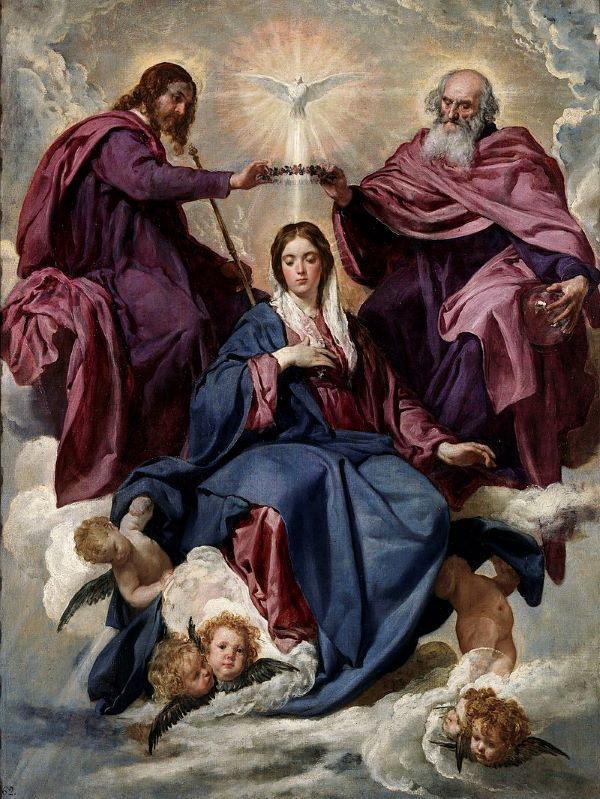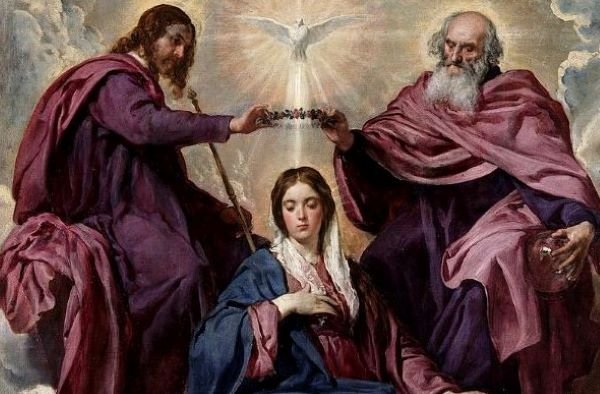The crowning of Mary as Queen of all creation is the culmination of all the privileges granted to our Lady. The Mother of God, assumed body and soul into heaven, is raised by the Most Holy Trinity above the choirs of angels and all the saints: Greater than you, only God, exclaim the Christian people.
A messianic psalm sings of the King's glory, and also of the glory of the Queen: Thou art the fairest of the children of Adam; grace is poured out on thy lips, for God has blessed thee forever and ever…Thy throne, O God, is forever, without end; a scepter of righteousness is the scepter of thy reign (Ps 44/45:3-7). Then the psalmist turns to the Queen: Listen, daughter, and see, give ear, forget thy people and the house of thy father, and the King will give thee beauty; he is thy Lord, turn to him… She is brought to the King, the bejeweled daughter of the King, radiant with glory, in robes of gold, trimmed in rich colors. With her virginal court following in procession…in happiness and rejoicing she is brought into the palace of the King (Ibid, 11-16).

The liturgy applies this psalm to Christ and Mary in heavenly glory. This interpretation is based on passages in the Gospels that refer explicitly to our Lady. At the Annunciation, St. Gabriel reveals to Mary that her Son will reign forever over the house of Jacob and his reign will have no end (Lk 1:33). Mary is to be mother of a son who, at the very instant of his conception as man, is King and Lord of all creation; and the mother who is to give birth to him will share in his kingship. St. Elizabeth, enlightened by the Holy Spirit, proclaims in a loud voice: Who am I that the Mother of my Lord should come to visit me? (Lk 1:43). And St. John the Evangelist, in his vision of the Apocalypse, describes a woman clothed with the sun, the moon under her feet, and on her head a crown of twelve stars (Rev 12:1). According to the Church's liturgy and tradition, this woman is Mary, who with Christ defeats the infernal dragon and is enthroned as Queen of the universe.
The certainty that Mary is the Mother of God and Mother of all mankind is what grounds our filial trust in her powerful intercession.
The Christian people have always attested to Mary's exalted glory as a sharer in Christ's royalty. Like him, it is hers by birth (as Mother of the King) and by right of conquest (as his faithful co-worker in the Redemption). Our Lord has placed in her hands the superabundant merits He gained by his death on the Cross, so that she might distribute them according to God's Will.
The Queenship of Mary is a consoling truth for all mankind, especially when we feel deserving of divine punishment as a just penalty for our sins. The Church invites us to have recourse to Mary, our Mother and our Queen, in all our necessities. The certainty that Mary is the Mother of God and Mother of all mankind is what grounds our filial trust in her powerful intercession, and encourages us to get up after our falls.
As this series on our Lady's life comes to an end, we invoke her with the words of an ancient prayer: “Hail, holy Queen, Mother of mercy; our life, our sweetness, and our hope. To thee do we cry, poor banished children of Eve. To thee do we send up our sighs, mourning and weeping…." We place all our trust in Mary, because a mother always hears the supplications of her children. “Remember, O most gracious Virgin Mother of God," we tell her, “when you stand in the sight of the Lord, to speak well of us" (cf. Jer 18:20). Our Lady will always speak well of us before the Father, the Son, and the Holy Spirit, and obtain from God all that we need—above all, the grace of final perseverance, which will open to us the gates of heaven: “Pray for us sinners, now and at the hour of our death. Amen."
J.A. Loarte
